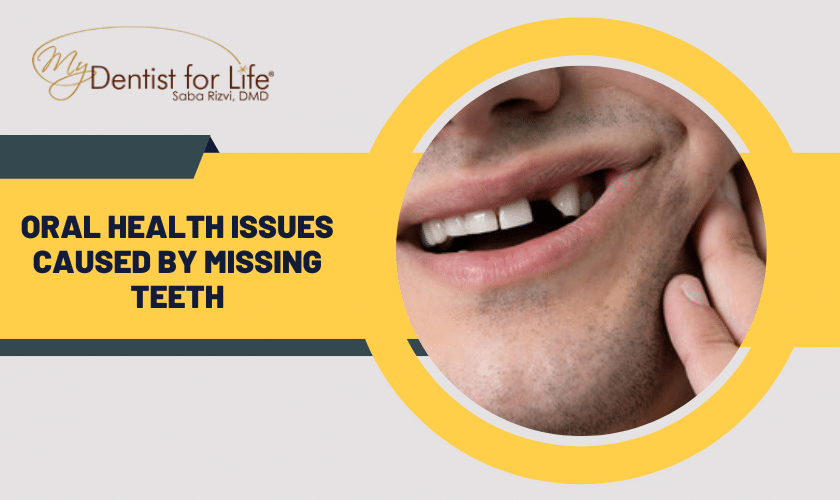ONLINE SCHEDULING AND VIRTUAL CONSULTS AVAILABLE

5 Oral Health Issues Caused by Missing Teeth

Are you missing a tooth or two? While it may not seem like a big deal, the truth is that missing teeth can have serious consequences for your oral health. From jaw pain to gum disease, there are several issues that can arise when teeth go missing. In this blog post, we’ll take a closer look at five common oral health problems caused by missing teeth – and what you can do to prevent them from happening to you!
Here are 5 Oral Health Issues Caused by Missing Teeth:
It’s no secret that oral health is important to our overall well-being. Good oral health habits can help prevent a number of serious health problems, including heart disease, stroke, and diabetes. However, did you know that missing teeth can also lead to a number of oral health issues? Here are some oral health issues caused by missing teeth. Continue reading the blog!
Issue 1: Jaw Pain
Jaw pain is a common issue for those who have missing teeth. When teeth are missing, the jawbone no longer has the support it needs, which can lead to pain in the jaw. This pain can be mild or severe, and it may come and go. It’s important to see a dentist if you’re experiencing jaw pain, as it could be a sign of a more serious problem.
Issue 2: Difficulty Chewing and Speaking
If you’re missing teeth, you may have difficulty chewing and speaking. This is because your teeth play an important role in both of these functions. When you chew, your teeth break down food so that it can be easily swallowed. And when you speak, your teeth help you form words correctly.
If you’re missing teeth, you may not be able to chew properly. This can make it difficult to eat certain foods or even to eat enough food to get the nutrition your body needs. You may also find that your speech is affected. This is because, without teeth, it’s harder to form words correctly. You may slur your words or have trouble pronouncing certain sounds.
If you’re missing teeth and having difficulty chewing or speaking, there are options available to help you. Dental implants are one option for replacing missing teeth. With dental implant treatments, artificial teeth are placed in the jawbone to replace missing natural teeth. Another option is dentures, which are false teeth that can be removed and put back in place. Dentures can help improve chewing and speaking ability for people who are missing most or all of their natural teeth. Talk to your dentist about which option is right for you based on the number of missing teeth and your overall oral health.
Issue 3: Facial Structure Changes
When teeth are missing, the bones that supported them begin to shrink. This can change the shape of a person’s face and make them look older. The changes in facial structure can also make it difficult to eat and speak.
Issue 4: Gum Disease
If you have missing teeth, you may be at risk for gum disease. When teeth are missing, there are more spaces for bacteria to build up and cause infection. Additionally, the gums around the remaining teeth can become inflamed and infected.
Gum disease is a serious oral health issue that can lead to tooth loss and other complications. If you think you may have gum disease, it’s important to see your dentist right away for periodontal treatment.
Issue 5: TMJ Dysfunction
TMJ dysfunction is a common oral health issue caused by missing teeth. The TMJ is the joint that connects the lower jaw to the skull and is responsible for chewing and moving the jaw. When there are missing teeth, the TMJ can become misaligned and cause pain and discomfort. Treatment for TMJ dysfunction often includes wearing a splint or mouthguard at night to keep the jaw in place, as well as avoiding hard and chewy foods. In severe cases, surgery may be necessary to correct the problem.
Conclusion
Missing teeth can cause a wide range of oral health issues, from jaw pain to gum disease. It’s important for those with missing teeth to take steps to protect their remaining teeth and ensure that they are not at risk for further damage or decay. Regular visits to the dentist, brushing twice a day, flossing daily, using an electric toothbrush, and drinking plenty of water are all key habits in maintaining good oral hygiene and preventing dental problems in the future. Taking care of your mouth is essential for having healthy teeth and gums throughout your life!
Frequently Asked Questions
A: Missing teeth can cause a number of oral health issues, including gum disease, cavities, and jaw pain.
A: There are a few things you can do to prevent these issues, including brushing and flossing regularly, using mouthwash, and visiting your dentist regularly.
A: If you start to experience any of these issues, you should see your dentist as soon as possible to get treated.




